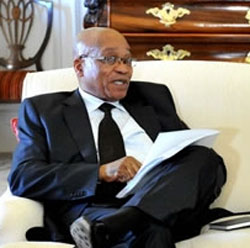
Top stories






More news













Not that I agree with him, heaven forbid. But because I firmly believe that he has as much right to freedom of speech as anyone else and more importantly, I believe that free speech can eventually create more tolerance.
The past couple of weeks have seen a significant increase in racist remarks, particularly on social media platforms, which has led to debates and possible court cases with regard to the placing the onus on media owners to censor remarks made by racists and bigots in the comments sections of online media. (Read Blade Nzimande's opinion on the issue here.)

There are those who might argue that, like taxi drivers who are so much of a law unto themselves that formerly law abiding motorists simply follow suit and behave like idiots on the road, so too is President Zuma making it okay to indulge in white bashing.
The obvious solution might appear to be a clampdown on racism and hate speech in the mass media and online. But it is not. All that would do is make matters worse.
In my opinion, now more than ever before, society needs to understand the role of free speech, even in its most extreme and provocative form.
Quite simply, if everyone from presidents to paupers is allowed to say what they like without any form of restriction, there will come a time, very quickly, when society simply ignores it all.
The same way that dealing with a bully is to ignore him, because bullies thrive on getting some sort of reaction from their victims.
People who post scurrilous comments online or in mass media that air provocative views and opinions are all hooping to get some sort of reaction.
And as long as provocation is taken too seriously by imposing restrictions and limits, the more the provocateurs will flourish.
Take the recent Charlie Hebdo catastrophe as an example. Here we have a weekly magazine with a pitifully small circulation of about 60,000 in a country with a population of 66 million.
Suddenly, one week after a massacre of its staff by religious extremists, the print order for the next issue shot up to seven million.
Which suggests that all those two gunmen achieved was not to silence what was a small voice, but to make that voice much louder by increasing the Charlie Hebdo circulation to the point where they might well qualify for a Guinness Book of Records entry for having achieved the biggest circulation increase in the history of print media.
It is logical to assume that eventually even deranged religious fanatics will realise that the attack on Charlie Hebdo actually backfired quite cataclysmically and achieved completely the opposite of what was intended.
Interestingly, when one looks at whom the Charlie Hebdo provocateurs picked on in the past, the Catholic Church received far more attention that Islam.
But, as Christians have the sometimes-annoying habit of largely ignoring attacks on their religion, only a tiny proportion of French speaking people actually took any notice of what Charlie Hebdo printed about Catholics.
In South Africa, where it is a lot more difficult for society to succeed in complaints about television programming than it is with regard to TV advertising, there is a far greater intolerance for what appears in advertising than in run-of-the-mill programmes.
This disparity is very clearly based on the fact that those who would complain about advertising will get a far more favourable reaction from the advertising regulators than their broadcast counterparts do.
The more regulations that are imposed on advertising content, the greater the social intolerance.
With the tsunami of information, opinion and provocation available through mass and social media, consumers the world over are being forced to choose. And it is human nature that the majority will choose those titles to which they have some sort of affinity and with which they can carry on a conversation.
Already one can see clear evidence that Facebook and Twitter followers have no compunction in 'unfollowing' anyone or any media that display opportunism, idiocy and intolerance.
The same applies to all those regulations favoured by nanny state governments. The more they try to increase social tolerance by legislating against issues that seem to offend a tiny minority, the more intolerance is created.
I believe, for example, that one of the reasons newspapers the world over have lost circulation and in many cases been forced to close down, is that former readers simply have tired of sensationalism.
In the same way that radio listeners have grown tired of shock jocks.
Thirty years ago in Scandinavia, authorities were worried about an increase in the number of children reading pornographic magazines in spite of these being sealed in plastic and placing them high up on newsagents' shelves. Nothing worked.
They then took them out of the plastic bags and put them lower down on the shelves. It was not too long before kids realised that pornography was actually boring and the incidence of child consumption of pornography dropped significantly.
In South Africa, the same thing happened in1994 with 'girlie' magazines closing down one after the other as they lost their forbidden fruit appeal.
And finally, the thing about freedom of speech is that once the tiniest and most insignificant of terms and conditions are added, it is no longer free speech.
There are no degrees of freedom of expression. Either it is or it isn't.
*Note that Bizcommunity staff and management do not necessarily share the views of its contributors - the opinions and statements expressed herein are solely those of the author."
